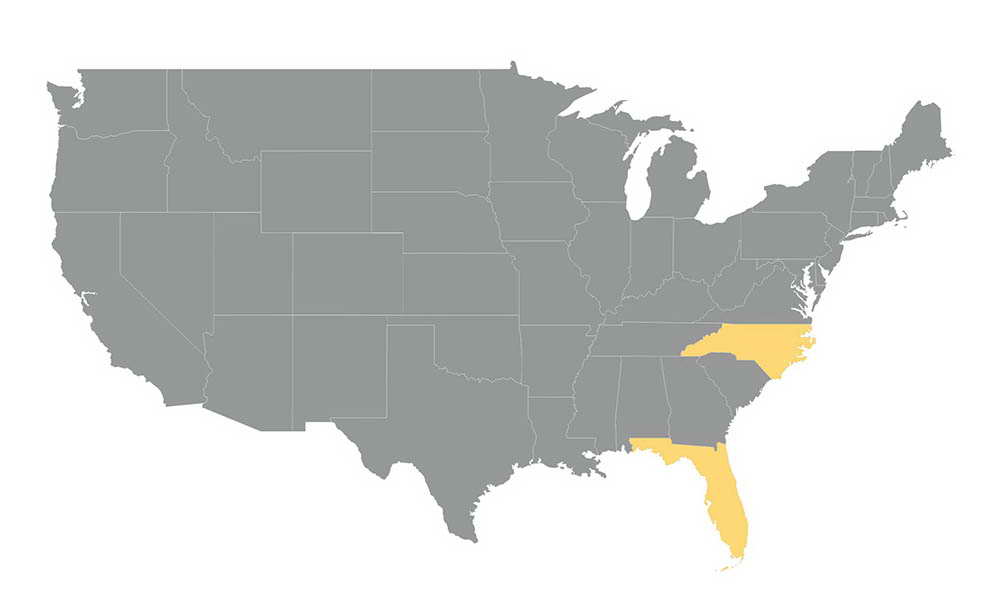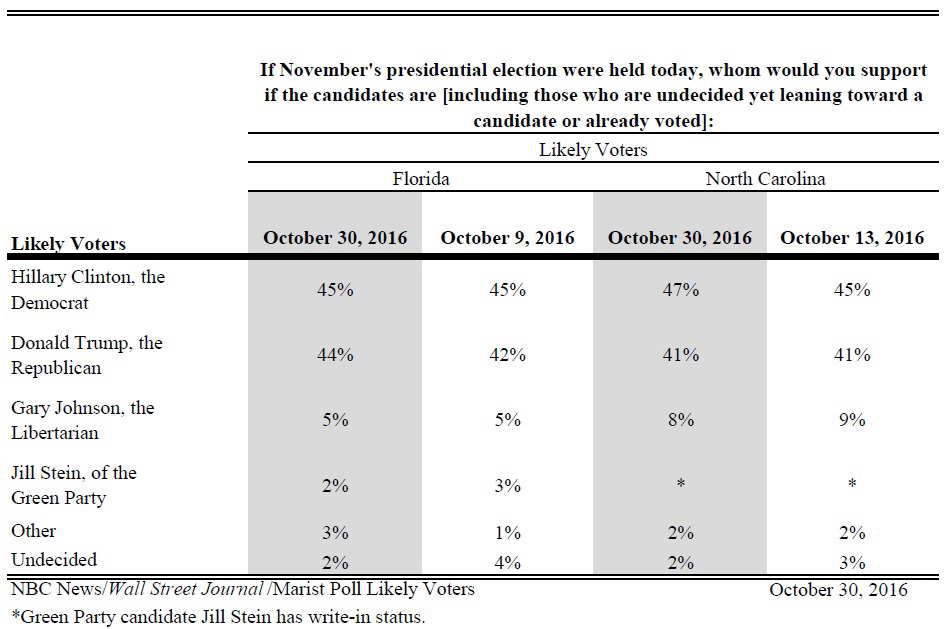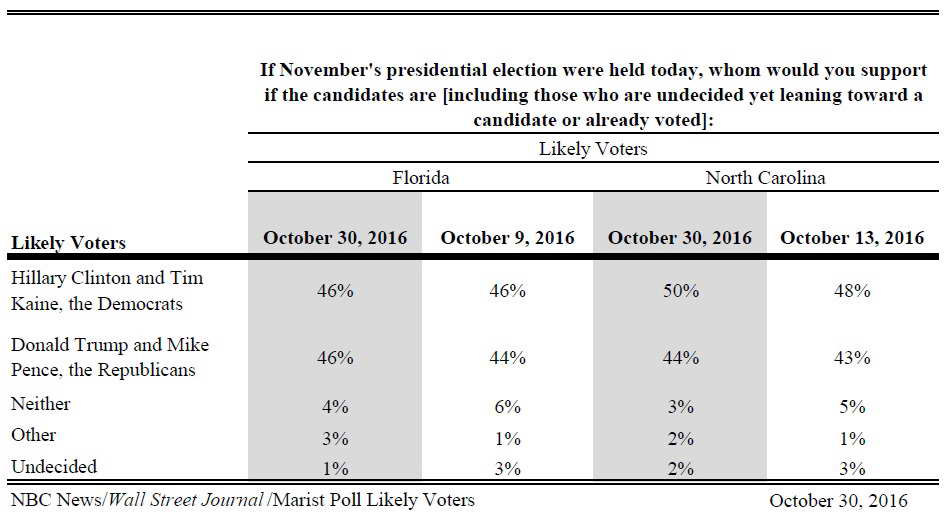October 30, 2016
10/30: Florida & North Carolina Last Looks
NBC News/WSJ/Marist Poll
In Florida, Democrat Hillary Clinton, 45%, and Republican Donald Trump, 44%, are in a fierce battle among likely voters statewide including those who are undecided yet leaning toward a candidate or who have already voted. Libertarian candidate Gary Johnson receives 5% while Green Party candidate Jill Stein has 2%. Three percent of Florida likely voters support another candidate, and 2% are undecided.
In the NBC News/Wall Street Journal/Marist Poll of Florida released earlier this month, Clinton had 45% to 42% for Trump. Five percent of Florida likely voters supported Johnson while 3% were for Stein. One percent were for another candidate, and 4% were undecided.
In North Carolina, Clinton receives 47% to 41% for Trump among likely voters statewide including those who are undecided yet leaning toward a candidate or who have already voted. Johnson has the support of 8%, 2% back another candidate, and 2% are undecided. Of note, in North Carolina, Jill Stein of the Green Party has write-in status.
In the NBC News/Wall Street Journal/Marist Poll of the Tar Heel State released earlier this month, Clinton had 45% to 41% for Trump among likely voters statewide. Nine percent backed Johnson, and 2% supported another candidate. Three percent, at the time, were undecided.
“For Trump, Florida is a must-win state, and right now, it could go either way,” says Dr. Lee M. Miringoff, Director of The Marist College Institute for Public Opinion. “Strategically, the Clinton camp has been banking on North Carolina as a crucial state in its firewall to reach 270, and she seems well-positioned to carry the state.”
In Florida, Clinton, 89%, and Trump, 88%, maintain the support of their respective party’s base. Among independents who are likely to vote, Trump leads Clinton by 5 points, 41% to 36%. Johnson has 11% while Stein garners 3%. The tide has turned among independent likely voters. Clinton previously had a 9-point advantage over Trump, 42% to 33%. 13% supported Johnson, at that time, and 7% were for Stein.
Trump retains his double-digit lead over Clinton among white likely voters in Florida, 54% to 34%. Previously, Trump outpaced Clinton by a similar 19 points among these voters. Among African Americans likely to cast a ballot, 92%, up from 83% previously, support Clinton. Trump receives only 2% of the African American vote in Florida. Clinton, 56%, leads Trump, 34%, by 22 points among Latinos likely to vote, but Clinton’s advantage is down from 36 points previously.
Looking at race and education, Trump, 62%, continues to outpace Clinton, 26%, among white likely voters without a college education in Florida. His current 36-point lead is little changed from the 33-point advantage he had earlier this month. Among white likely voters with a college education, Trump and Clinton are competitive, 45% to 43%. Trump previously edged Clinton by 5 points among these voters.
A gender gap remains in Florida. Clinton, 51%, is ahead of Trump, 42%, by 9 points among women who are likely to vote while Trump, 48%, leads Clinton, 37%, by 11 points among men likely to cast a ballot. In early October, Clinton was ahead of Trump by 13 points among women while Trump had a 9-point lead over Clinton among men.
Among many key demographic groups, North Carolina mirrors Florida. Like Florida, Clinton garners the support of most Democrats, 92%, while Trump has the backing of most Republicans, 89%. However, among independents likely to vote, Clinton, 41%, has opened up a lead over Trump, 35%. Johnson receives 19%. Previously, Clinton and Trump were tied at 36% among independents likely to vote. Johnson had 20% at the time of the previous NBC News/Wall Street Journal/Marist Poll of North Carolina.
Among white likely voters in North Carolina, Trump, 53%, outdistances Clinton, 33%, by 20 points, similar to his lead earlier this month. Clinton, 95%, carries most African Americans who are likely to vote, an increase from 83% previously. Trump and Johnson have the support of only 2% each of African Americans likely to vote, a dip from earlier this month.
Among white likely voters without a college education, Trump, 65%, outpaces Clinton, 22%, by nearly three to one in North Carolina. Trump’s 43-point advantage among these voters has increased from 38 points in mid-October. Clinton, 48%, now has a double-digit lead over Trump, 38%, among white likely voters with a college education. This is up from her 4-point edge earlier this month.
Looking at the gender breakdown in North Carolina, Clinton is ahead of Trump, 52% to 38%, by 14 points among women, the identical lead she previously received. However, Trump’s lead among men likely to vote is down. Trump, 44%, and Clinton, 42%, are now competitive among men. Trump previously held a 7-point lead over Clinton among this group of voters.
Among registered voters in Florida, Clinton, 44%, and Trump, 42%, are closely matched. Johnson has 5% while Stein receives 2%. Three percent support another candidate, and 3% are undecided.
In North Carolina, Clinton, 46%, maintains her 6-point lead over Trump, 40%, among registered voters statewide. Nine percent support Johnson, and 2% back another candidate. Three percent are undecided.
Looking at the two-way matchup in Florida, Clinton and Trump are tied at 46% among likely voters statewide including those who are undecided yet leaning toward a candidate or who have already voted. Four percent do not support either candidate, and 3% are for someone else. One percent are undecided. Among Florida likely voters with a candidate preference, seven in ten, 70%, say they strongly support their choice of candidate for president. 74% of Trump’s supporters, compared with 67% of Clinton’s backers, say they will not waver in their commitment to their candidate selection.
In the head-to-head contest between Clinton and Trump in North Carolina, 50% of likely voters support Clinton while 44% back Trump. Three percent do not support either candidate, 2% are for someone else, and 2% are undecided. Among North Carolina likely voters with a candidate preference, 69% say they strongly back their choice of candidate for president. 70% of Trump’s supporters and 68% of Clinton’s backers report they will not waver in their commitment to their presidential candidate of choice.
Clinton and Trump have high net negative ratings in Florida and North Carolina. In Florida, 39% of likely voters have a favorable opinion of Clinton while 58% have an unfavorable one, a net negative of 19 points. Earlier this month, Clinton’s net negative score was 16 points in the Sunshine State.
Trump currently has the same net negative rating, 19 points, as Clinton in Florida. 38% of likely voters have a positive opinion of Trump while 57% have a negative one. His previous net negative score in the state was 17 points.
In North Carolina, Clinton has a net negative rating of 14 points, identical to what she received previously. 41% of North Carolina likely voters currently have a positive view of Clinton while 55% do not. Trump’s net negative in North Carolina is also unchanged and stands at 25 points. 35% have a favorable view of him while 60% have an unfavorable one.
Turning to the Senate race in Florida, incumbent Republican Senator Marco Rubio, 51%, now has an 8-point lead over Democrat Patrick Murphy, 43%, among likely voters including those who are undecided yet leaning toward a candidate or who have already voted. Four percent support another candidate, and 2% are undecided. In the previous NBC News/Wall Street Journal/Marist Poll of Florida, Rubio, 48%, and Murphy, 46%, were competitive. Two percent supported another candidate, and 4% were undecided.
52% of likely voters with a candidate preference for the U.S. Senate in Florida say they strongly support their choice of candidate, little changed from 54% just a few weeks ago. Among Rubio’s supporters, 53% report they are firmly committed to him while 51% of Murphy’s backers say they will not waver in their support for their selection of candidate. These proportions are little changed from the previous poll.
“Marco Rubio is running 7 points ahead of Donald Trump in Florida and has established himself as a front-runner to keep his seat in the Senate,” says Dr. Lee M. Miringoff, Director of The Marist College Institute for Public Opinion.
In the race for U.S. Senate in North Carolina, Republican incumbent Richard Burr and Democrat Deborah Ross are tied at 48% among likely voters statewide including those who are undecided yet leaning toward a candidate or who have already voted. Two percent are for another candidate, and 3% are undecided. In the previous NBC News/Wall Street Journal/Marist Poll in the state, Burr and Ross were tied at 46% among likely voters.
55% of likely voters with a candidate preference for U.S. Senate in North Carolina, similar to 57% previously, report they are strongly committed to their choice of candidate. 54% of Ross’ backers, down from 59%, are firmly committed to her. 56% of Burr’s backers, similar to 54% earlier in the month, expressed the same intensity of support.
“Like Rubio in Florida, Burr also outpaces Trump by 7 points in North Carolina,” says Dr. Lee M. Miringoff, Director of The Marist College Institute for Public Opinion. “But, given Clinton’s stronger showing in North Carolina, it still remains to be seen whether he can hold onto his Senate seat.”
Turning to the contest for governor in North Carolina, Democrat Roy Cooper, 51%, now leads Republican incumbent Pat McCrory, 45%, by 6 points among likely voters including those who are undecided yet leaning toward a candidate or who have already voted. Two percent are for another candidate, and 2% are undecided. Earlier this month, the race between Cooper, 49%, and McCrory, 48%, was competitive.
Nearly three in four North Carolina likely voters with a candidate preference, 73%, strongly support their choice of candidate for governor. This is a marked increase from the 57% who previously expressed this intensity of support. 73% of McCrory’s supporters, up from 54%, and 72% of Cooper’s backers, up from 59%, say they are firmly committed to their choice of candidate for governor.
48% of Florida residents approve of the job performance of President Barack Obama. 44% disapprove, and 8% are unsure. These proportions are little changed from earlier in October when 49% approved of how the president was doing his job, and 43% disapproved. Seven percent, then, were unsure. Florida likely voters currently divide with 47% reporting they approve of how the president is performing and 48% saying they disapprove. Five percent are unsure.
President Obama’s approval rating among North Carolina adults stands at 48%. 43% of residents in North Carolina disapprove of how the president is doing his job, and 9% are unsure. Earlier this month, 50% of North Carolina adults thought well of how the president was performing in office while 44% did not. Among likely voters, 50% approve of the president’s job performance while 45% disapprove. Five percent are unsure.
Marist Poll Methodology for Florida
Nature of the Sample for Florida





